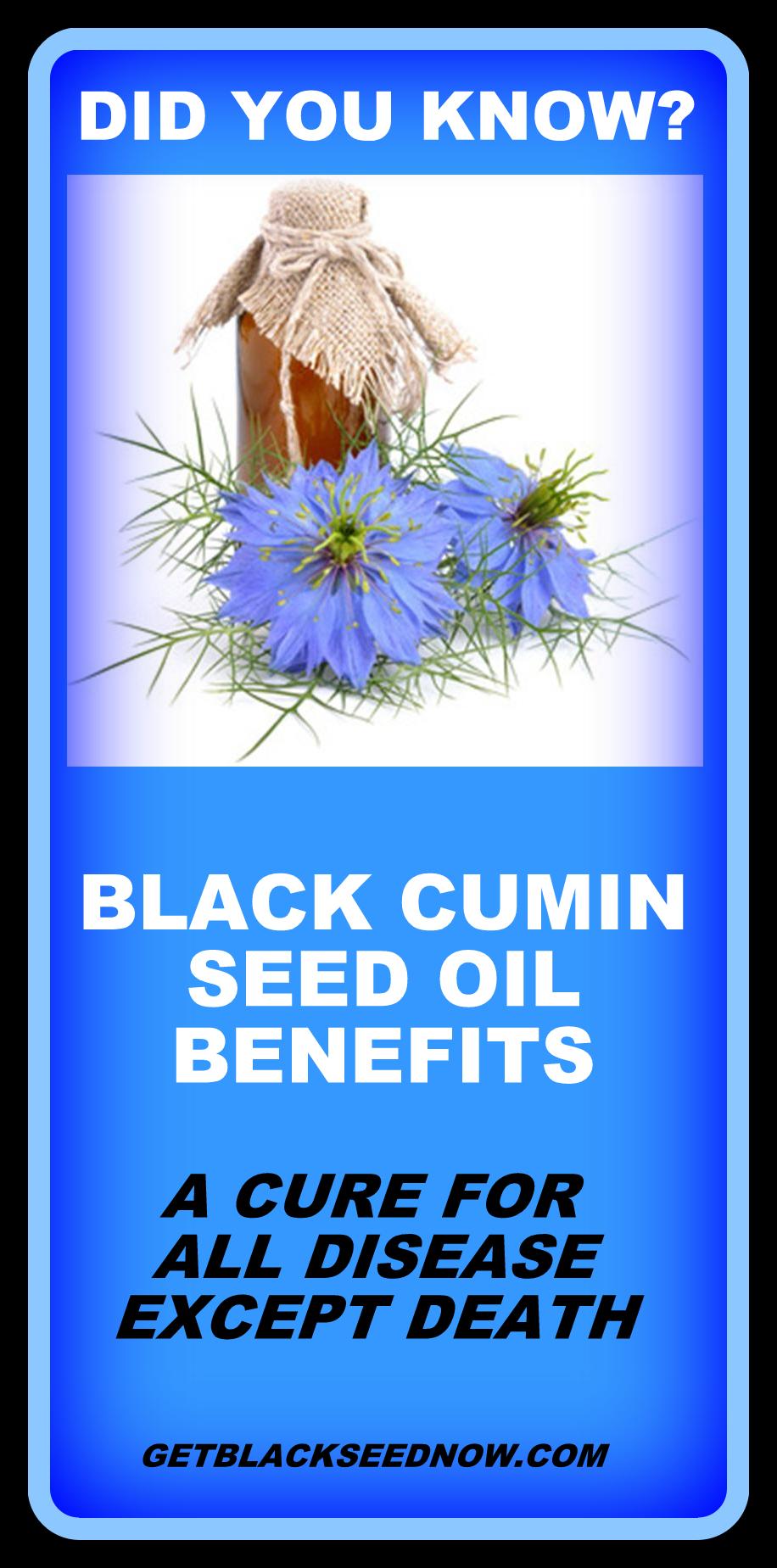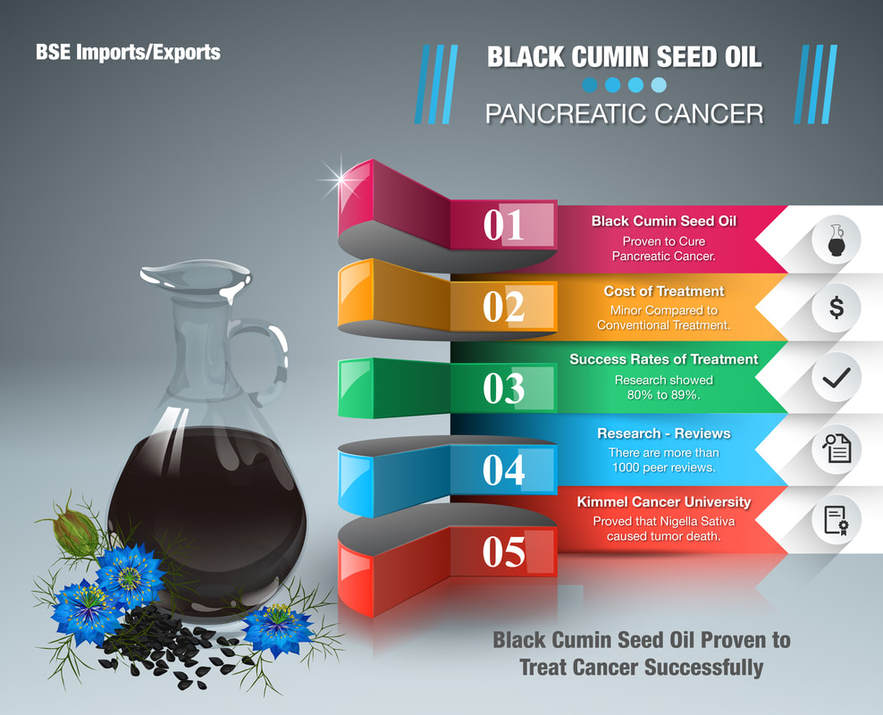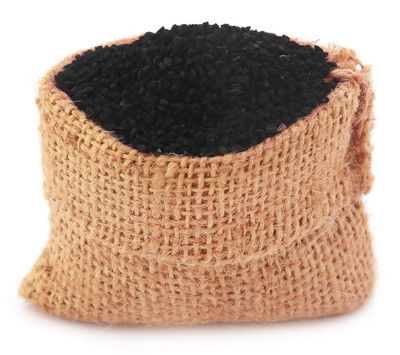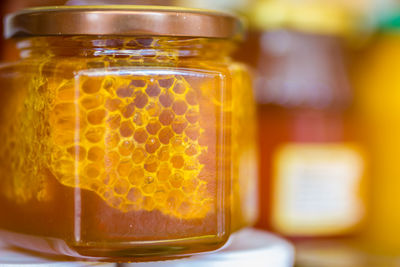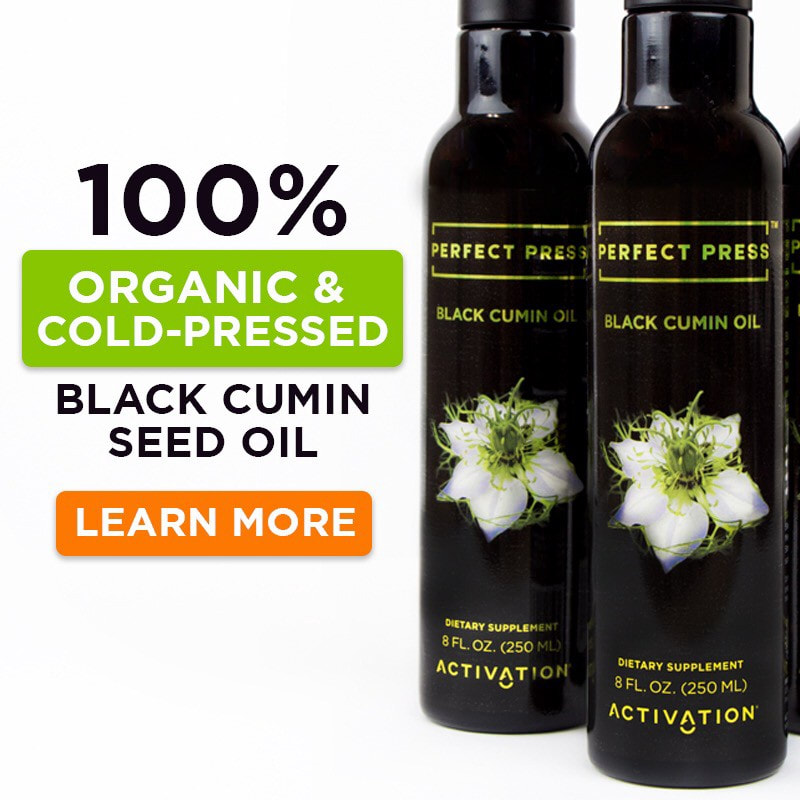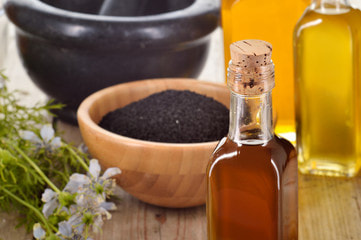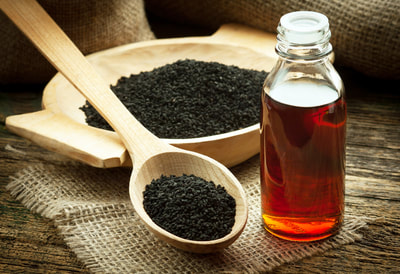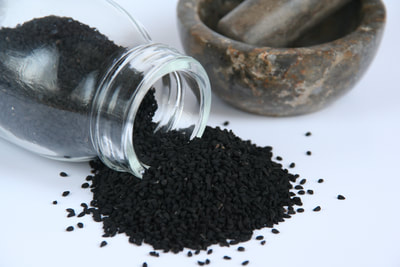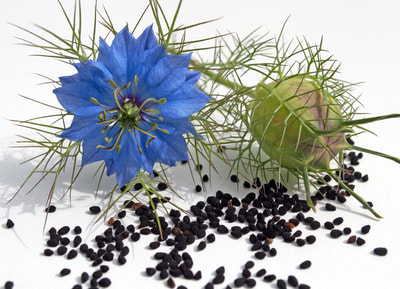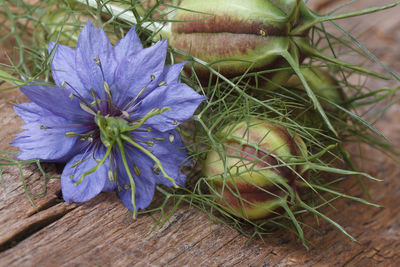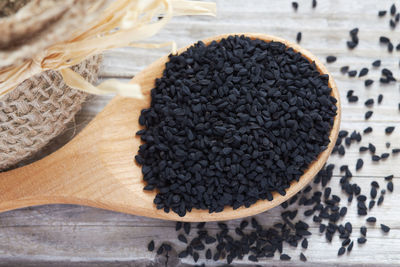BLACK CUMIN SEED OIL BENEFITS
This article was reviewed and edited by Dr. Muhammad Mukhtar, PHD and Notable Google Scholar on August 25, 2018 Written by Angelica Mae Batuco,RN, BSN with Dr. Muktar Assisting.
THIS ARTICLE IS COPYRIGHTED FOR NIGELLA--SATIVA.COM. ALL RIGHTS RESERVED. THIS ARTICLE CONTAINS AFFILIATE LINKS I RECOMMEND. PLEASE SEE OUR DISCLOSURE POLICY.
THIS ARTICLE IS COPYRIGHTED FOR NIGELLA--SATIVA.COM. ALL RIGHTS RESERVED. THIS ARTICLE CONTAINS AFFILIATE LINKS I RECOMMEND. PLEASE SEE OUR DISCLOSURE POLICY.
|
Nigella sativa is the scientific name for herb commonly known as black cumin. Seeds of this herb and oil extracted from them are widely used for treating a variety of ailments. Notably, cumin seeds are recognized as one of most effective Islamic medicine due to Holy Prophet (PBUH) saying that "There is healing in Black Seed for all diseases except death."
Importantly, Avicenna the most influential physician of the Islamic golden age considered cumin seed as “the Cannon of Medicine” meaning providing necessary energy for treatment of ailments [1]. Black cumin seed is also recognized with several other names including:
Nigella is mainly grown in India and the Middle East, and its Arabic name is Habbat-al-barakah, meaning ‘the seed of blessing.' It has been traditionally used in ancient Middle Eastern countries for various ailments and even described it as a panacea. Nigella sativa has been known for its medicinal qualities since time immemorial. The earliest record of Black cumin seed usage for treatment purposes dates to Hippocrates era 5th century B.C and has been appreciated almost in every system of medicine including Ayurveda [2]. Nutritional Benefits of Black Cumin Seed Oil
Black cumin seeds and their oil extracts are generally considered to be safe for consumption and are used as a home remedy for disease prevention and promoting good health. The health-improving potential of black cumin has been attributed to the active components that are primarily concentrated in the |
oil. Based on a study, there are over 100 different beneficial compounds found and characterized in black cumin seed oil. Among these the most prominent are essential fatty acids, sterols, antioxidants and several unique phytomedicinal constituents beneficial for human health. A few worth mentioning are:
Omega Fatty AcidsThere are several studies describing the presence of unsaturated fatty acids in black cumin seed oil. Unsaturated fatty acids are considered beneficial when compared with saturated fatty acid. A study from Iraq compared the presence of saturated versus unmatured fatty acids in cumin seed oil and found that cumin seed oil is mainly comprised of unsaturated fatty acid (79.87%) and relatively lesser amount of saturated fatty acids (15.13%) [3]. Among several the most prominent fatty acid identified are:
A higher composition of unsaturated fatty acids proves the health benefits of cumin seed oil. Particularly, Omega-6 (Linoleic acid) and Omega-3 (EPA and DHA) nutritional supplements are marketed for several ailments and improving health conditions. The black cumin seed oil is considered a rich source of these beneficial biomolecules.
The EPA and DHA are highly valued forms of Omega-3 fatty acids mainly extracted from fish. The health benefits of DHA for the growth and development of infant and adult brain are well established. Consuming foods rich in DHA may improve learning ability and bring positive effects on various diseases such as depression, hypertension, arthritis, diabetes mellitus type 1& 2, atherosclerosis, thrombosis, certain cancers and myocardial infarction.
Thymoquinone
Thymoquinone is one of the major constituents of black cumin seed oil. The health benefits of thymoquinone are due to its antioxidant, anti-inflammatory and hepatoprotective properties. Moreover, thymoquinone blocks the production of pro-inflammatory chemicals such as prostaglandins to reduce inflammation and thus relieve pain. Several other benefits associated with thymoquinone are enhanced bile production necessary for detoxification and fat breakdown of toxic materials produced within the body [4,5,6].
Nigellone
Nigellone is a phytoquinone present in black cumin seed oil having anti-spasmodic, bronchodilation and warming effect and as such is recommended for treating disorders associated with the respiratory system such as whooping cough and bronchial asthma [7]. Also, it inhibits the production of histamine, making it a natural alternative to medications containing cortisone for allergy sufferers.
Saponin Melanthin
Black cumin seed oil also contains saponin melanthin, a unique type of glycosides. These saponins promote nutrient absorption by stimulating gastric juices. An increase in the secretion of gastric juice is also accompanied with a diuretic effect.
Amino Acids
Amino acids are the building blocks of protein in the human body. Among the 20 found in human several can be synthesized within the body; however, nine are considered essential to be taken from outside in dietary items for balanced health. The black cumin seed has been reported to contain 15 amino acids, including the 8 of the nine essential amino acids, which include histidine, isoleucine, leucine, lysine, methionine, phenylalanine, threonine and tryptophan (Valine is the missing essential amino acid) [8].
It also contains Arginine – a semi-essential amino acid necessary for various metabolic processes. This amino acid can improve blood flow, boosts the immune system, stimulates the release of insulin and growth; and alleviates erectile dysfunction.
Selenium
Several scientific studies have reported the presence of selenium in black cumin seed. It is an essential mineral that acts as a powerful antioxidant and lower the risk of several types of cancers. Importantly selenium helps in preventing mental decline, protect the heart from diseases, boost immunity, and may reduce asthma symptoms.
Beta-Sitosterol
Beta-sitosterol compound has been reported in black cumin seeds and has the properties of lowering cholesterol level, anti-cancer and anti-tumor capabilities is also present in cumin seeds oil.
Vitamins and MineralsBlack seed oil is an excellent source of Vitamin B1 (Thiamine), B2 (Riboflavin), Vitamin B3 (Niacin), calcium, sodium, iron, and potassium. These vitamins and minerals are only needed in trace amounts as they act as co-factors for various enzyme functions [9].
Omega Fatty AcidsThere are several studies describing the presence of unsaturated fatty acids in black cumin seed oil. Unsaturated fatty acids are considered beneficial when compared with saturated fatty acid. A study from Iraq compared the presence of saturated versus unmatured fatty acids in cumin seed oil and found that cumin seed oil is mainly comprised of unsaturated fatty acid (79.87%) and relatively lesser amount of saturated fatty acids (15.13%) [3]. Among several the most prominent fatty acid identified are:
- Linoleic acid 42.76%
- Oleic acid 16.59%
- Palmitic acid 8.51%
- Eicosatrienoic acid 4.71%
- Eicosapentaenoic acid EPA 5.98%
- Docosahexaenoic acid DHA 2.97%
A higher composition of unsaturated fatty acids proves the health benefits of cumin seed oil. Particularly, Omega-6 (Linoleic acid) and Omega-3 (EPA and DHA) nutritional supplements are marketed for several ailments and improving health conditions. The black cumin seed oil is considered a rich source of these beneficial biomolecules.
The EPA and DHA are highly valued forms of Omega-3 fatty acids mainly extracted from fish. The health benefits of DHA for the growth and development of infant and adult brain are well established. Consuming foods rich in DHA may improve learning ability and bring positive effects on various diseases such as depression, hypertension, arthritis, diabetes mellitus type 1& 2, atherosclerosis, thrombosis, certain cancers and myocardial infarction.
Thymoquinone
Thymoquinone is one of the major constituents of black cumin seed oil. The health benefits of thymoquinone are due to its antioxidant, anti-inflammatory and hepatoprotective properties. Moreover, thymoquinone blocks the production of pro-inflammatory chemicals such as prostaglandins to reduce inflammation and thus relieve pain. Several other benefits associated with thymoquinone are enhanced bile production necessary for detoxification and fat breakdown of toxic materials produced within the body [4,5,6].
Nigellone
Nigellone is a phytoquinone present in black cumin seed oil having anti-spasmodic, bronchodilation and warming effect and as such is recommended for treating disorders associated with the respiratory system such as whooping cough and bronchial asthma [7]. Also, it inhibits the production of histamine, making it a natural alternative to medications containing cortisone for allergy sufferers.
Saponin Melanthin
Black cumin seed oil also contains saponin melanthin, a unique type of glycosides. These saponins promote nutrient absorption by stimulating gastric juices. An increase in the secretion of gastric juice is also accompanied with a diuretic effect.
Amino Acids
Amino acids are the building blocks of protein in the human body. Among the 20 found in human several can be synthesized within the body; however, nine are considered essential to be taken from outside in dietary items for balanced health. The black cumin seed has been reported to contain 15 amino acids, including the 8 of the nine essential amino acids, which include histidine, isoleucine, leucine, lysine, methionine, phenylalanine, threonine and tryptophan (Valine is the missing essential amino acid) [8].
It also contains Arginine – a semi-essential amino acid necessary for various metabolic processes. This amino acid can improve blood flow, boosts the immune system, stimulates the release of insulin and growth; and alleviates erectile dysfunction.
Selenium
Several scientific studies have reported the presence of selenium in black cumin seed. It is an essential mineral that acts as a powerful antioxidant and lower the risk of several types of cancers. Importantly selenium helps in preventing mental decline, protect the heart from diseases, boost immunity, and may reduce asthma symptoms.
Beta-Sitosterol
Beta-sitosterol compound has been reported in black cumin seeds and has the properties of lowering cholesterol level, anti-cancer and anti-tumor capabilities is also present in cumin seeds oil.
Vitamins and MineralsBlack seed oil is an excellent source of Vitamin B1 (Thiamine), B2 (Riboflavin), Vitamin B3 (Niacin), calcium, sodium, iron, and potassium. These vitamins and minerals are only needed in trace amounts as they act as co-factors for various enzyme functions [9].
|
Black Cumin Seed Pharmacological Actions Black cumin seed and its oil extract are one of the most commonly used traditional medicine in Middle East and several other parts of the world. Presence of several beneficial constituents reported in several scientific studies further proves its health benefits. Traditionally, black cumin seed oil has been used to strengthen the immune system, improve digestive health, treat ailments associated with the respiratory system, liver, kidney and the heart. There is a wealth of literature proving the disease-specific benefits of black cumin seed oil. A few worth mentioning are described as below:
ALL this prove why black cumin has been regarded as a ‘panacea,' which means ‘cure all' and even described as a ‘miracle herb.' Black Cumin Seed Therapeutic Applications Black cumin seed has a broad range of healing effects, supporting body organs functions, systems, and biological pathways. A disease is a condition that alters the functional capability of various physiological functions within the body, and black cumin seed oil restore these deformities to normal. Modulation of Weaker Immune System Our body immune system fights with disease-causing microorganisms as well as exert remedial steps for any functional abnormalities. The human immune system provides a natural defense for the human body. Evidence for the immune boosting properties of the black cumin seeds and its products can be ascertained from the historical note by the Avicenna, the famous philosopher describing cumin seeds as “Canon of Medicine” meaning that it provides the necessary energy to the body for curing diseases. |
The immunomodulatory effects of black cumin seeds/oils provide therapeutic effects for almost every ailment. Besides immunomodulation, the antioxidant effect exerted through polyunsaturated fatty acids to further strengthen and revitalize the immune system when used regularly as a preventive treatment.
For boosting your body strength to fight with diseases, the immune system can be modulated by using black cumin seeds in several ways as described below:
Disturbed Sleep
According to several scientific reports, black seed oil is a natural treatment for sleep disorders. Improvement in disturbed sleeping pattern and restful sleep can be achieved through usage of black cumin seed oil. For overcoming sleep disorders, the following has been recommended according to an interesting research article by Hussain and Hussain [10].
●"People who have insomnia should take one teaspoon of black seed oil and one teaspoon of honey in warm milk an hour before going to bed.
●Rub the temples with the oil and turn off the lights.
●People taking the oil should have only a light dinner, avoid sugary product just before bedtime. This helps to rest the pancreas that produces insulin."
Also read: The many health benefits of Himalayan Salt Therapy - Fabulous for disturbed sleep.
Menstrual Complaints and Female Disorders
Black cumin seeds regulate the hormones involved in menstruation and lactation. Females having disturbed menstrual cycles and issues with lactation to their young one can greatly benefit from black cumin seed treatments [10].
To use black cumin for menstrual problems:
Digestive Disturbances
Therapeutic potentials of black cumin seeds oil for gastrointestinal ailments have been extensively studied. Improving digestion is believed to be due to saponin melanthin, and the bitter property is ascribed to nigellin. Black cumin seed oil has been reported to control gastritis, increases gastric mucin necessary for digestion, overcome gastric mucosal ischemia, colitis. Importantly, black cumin seed oil also showed its beneficial effects in gastric infections associated with bacteria, fungi, and parasites [11].
Here’s a simple recipe to alleviate digestive problems such as flatulence, bloating, constipation and abdominal cramps:
High Cholesterol Levels
Black cumin seeds/oil benefits in lowering cholesterol is due to a variety of unsaturated essential fatty acids. Moreover, a unique component the beta-sitosterol has been reported to expert cholesterol-lowering effect.
To use black cumin seed to lower cholesterol level:
Diabetes
Unlike conventional diabetes drugs that only target the blood sugar or the insulin level, black cumin seed control blood sugar by activating several enzymes within the body (alpha-amylase, glucosidases) thus controlling diabetes [12].
The recommended dosage for controlling blood sugar is to take 1/2 to 1 teaspoon of black cumin seed. Dosage can be reduced or increased based on the patient outcome and sugar levels during the treatment period.
For boosting your body strength to fight with diseases, the immune system can be modulated by using black cumin seeds in several ways as described below:
- Bath: Add 5 to 8 drops of essential black seed oil to the bath water.
- Inhalation: To activate and stimulate the immune system, add 1 cup of black cumin seeds, or 5 drops of oil extract to 1 liter of hot water and inhale the steam.
- Internally: Take 1/2 to 1 teaspoon of black cumin oil 2 to 3 times with meals.
Disturbed Sleep
According to several scientific reports, black seed oil is a natural treatment for sleep disorders. Improvement in disturbed sleeping pattern and restful sleep can be achieved through usage of black cumin seed oil. For overcoming sleep disorders, the following has been recommended according to an interesting research article by Hussain and Hussain [10].
●"People who have insomnia should take one teaspoon of black seed oil and one teaspoon of honey in warm milk an hour before going to bed.
●Rub the temples with the oil and turn off the lights.
●People taking the oil should have only a light dinner, avoid sugary product just before bedtime. This helps to rest the pancreas that produces insulin."
Also read: The many health benefits of Himalayan Salt Therapy - Fabulous for disturbed sleep.
Menstrual Complaints and Female Disorders
Black cumin seeds regulate the hormones involved in menstruation and lactation. Females having disturbed menstrual cycles and issues with lactation to their young one can greatly benefit from black cumin seed treatments [10].
To use black cumin for menstrual problems:
- Tea: Drink 1 cup of black cumin tea twice a day
- To relax the uterus and abdominal muscles, add 5 to 8 drops of essential black cumin oil in a liter of hot water and use it to warm abdominal compresses.
Digestive Disturbances
Therapeutic potentials of black cumin seeds oil for gastrointestinal ailments have been extensively studied. Improving digestion is believed to be due to saponin melanthin, and the bitter property is ascribed to nigellin. Black cumin seed oil has been reported to control gastritis, increases gastric mucin necessary for digestion, overcome gastric mucosal ischemia, colitis. Importantly, black cumin seed oil also showed its beneficial effects in gastric infections associated with bacteria, fungi, and parasites [11].
Here’s a simple recipe to alleviate digestive problems such as flatulence, bloating, constipation and abdominal cramps:
- Tea recipe: Infuse teaspoon of crushed black cumin seed with 1/4 liter of hot water. Allow to draw for 10 minutes and strain. Drink 1 cup 2 to 3 times a day, if possible, unsweetened between meals.
High Cholesterol Levels
Black cumin seeds/oil benefits in lowering cholesterol is due to a variety of unsaturated essential fatty acids. Moreover, a unique component the beta-sitosterol has been reported to expert cholesterol-lowering effect.
To use black cumin seed to lower cholesterol level:
- Take 2 to 3 black cumin seed capsules with Vitamin E every day for several weeks.
Diabetes
Unlike conventional diabetes drugs that only target the blood sugar or the insulin level, black cumin seed control blood sugar by activating several enzymes within the body (alpha-amylase, glucosidases) thus controlling diabetes [12].
The recommended dosage for controlling blood sugar is to take 1/2 to 1 teaspoon of black cumin seed. Dosage can be reduced or increased based on the patient outcome and sugar levels during the treatment period.
According to Dr. Mercola "Various studies have been conducted regarding the potential anticancer benefits of black cumin seed oil. Researchers have found that it may be helpful against these cancers:7
• Colon
• Pancreatic
• Fibrosarcoma
Staying with the issue at hand, regular black cumin seeds may also be helpful in combatting certain cancers. Studies have found that black cumin seed may help fight these cancers:8 : • Liver • Lung • Breast • Blood • Cervical
Also we have many testimonies for other cancers, such as the 12 year old boy who cured his brain cancer with 9 capsules of black seed oil daily.
Protocol:
Stage 1 and II Cancer - 1 tablespoon of Black Seed Oil (results may not be the same with cheap oils) taken with 1 teaspoon of Yemeni Sidr Honey or Manukah Honey 1/2 hour before breakfast. You must be on a strict cancer diet also, have no stress, minimum sun and mild exercise. Rebounding is the best for cancer. I also suggest saffron infused black seed oil too.
Stage III and IV Cancer - You must be on a vegan cancer diet, take the above protocol but we must add in some strong supplements as the cancer as spread. I suggest Beta Glucan (Transfer is the best Brand), IP6 with Inosol, Vit D3 and C also.
• Colon
• Pancreatic
• Fibrosarcoma
Staying with the issue at hand, regular black cumin seeds may also be helpful in combatting certain cancers. Studies have found that black cumin seed may help fight these cancers:8 : • Liver • Lung • Breast • Blood • Cervical
Also we have many testimonies for other cancers, such as the 12 year old boy who cured his brain cancer with 9 capsules of black seed oil daily.
Protocol:
Stage 1 and II Cancer - 1 tablespoon of Black Seed Oil (results may not be the same with cheap oils) taken with 1 teaspoon of Yemeni Sidr Honey or Manukah Honey 1/2 hour before breakfast. You must be on a strict cancer diet also, have no stress, minimum sun and mild exercise. Rebounding is the best for cancer. I also suggest saffron infused black seed oil too.
Stage III and IV Cancer - You must be on a vegan cancer diet, take the above protocol but we must add in some strong supplements as the cancer as spread. I suggest Beta Glucan (Transfer is the best Brand), IP6 with Inosol, Vit D3 and C also.
Black Cumin Seed for Your Pets
Black cumin seed and its oils are not only beneficial among humans instead their benefits in animals have also been reported. Importantly all pre-clinical studies are also performed in animals, and along with similar lines, beneficial effects of black cumin seeds have been reported for treating gastrointestinal ailments [13], reported as neuroprotective [14] besides beneficial effects in the urinary tract infections [15].
Intestinal Worms
Like humans, animals are also prone to a variety of intestinal worms associated diseases. Infections with these worms induce a variety of symptoms such as brittle hair, lethargy, vomiting, fever, reduced appetite and other maladies. Black cumin seed’s anthelminthic and intestinal cleansing quality can help get rid of most species of parasitic worms without any side effects.
To use black cumin seed for parasitic worms:
Black cumin seed and its oils are not only beneficial among humans instead their benefits in animals have also been reported. Importantly all pre-clinical studies are also performed in animals, and along with similar lines, beneficial effects of black cumin seeds have been reported for treating gastrointestinal ailments [13], reported as neuroprotective [14] besides beneficial effects in the urinary tract infections [15].
Intestinal Worms
Like humans, animals are also prone to a variety of intestinal worms associated diseases. Infections with these worms induce a variety of symptoms such as brittle hair, lethargy, vomiting, fever, reduced appetite and other maladies. Black cumin seed’s anthelminthic and intestinal cleansing quality can help get rid of most species of parasitic worms without any side effects.
To use black cumin seed for parasitic worms:
- For smaller dogs: Add about a quarter of a teaspoon to its food
- For larger dogs: Add 1/2 teaspoon of black seed oil
Ticks
Black cumin seed oil can be used as natural tick protection. Ticks don't like the scent of black seed oil and would avoid your dog or cat. It also applies to flees and mites. To use black cumin seed oil, just massage the oil on your pet's fur. The rich fat content of the oil can also leave the fur strong and smooth.
There is an extensive list of both infectious and non-infectious disease among animals where black cumin seed oil can be used for treatment purposes. A few worth mentioning are:
Black cumin seed oil can be used as natural tick protection. Ticks don't like the scent of black seed oil and would avoid your dog or cat. It also applies to flees and mites. To use black cumin seed oil, just massage the oil on your pet's fur. The rich fat content of the oil can also leave the fur strong and smooth.
There is an extensive list of both infectious and non-infectious disease among animals where black cumin seed oil can be used for treatment purposes. A few worth mentioning are:
- Digestive problems
- Candida and other fungal infections
- Cancerous conditions in animals
- Skin and Hair
- Eczema and Psoriasis

How to Use Black Cumin Seed Oil
To use black cumin seed oil, please follow the dosage suggestions on my Dosage Page where you will find complete instructions for more than 50 diseases and illnesses. Always take the oil on an empty stomach.
If you are going to take capsules then follow the smart dosage suggestions. Capsules like oil should be taken slow at first. So take 1 to 2 capsules a day and then gradually build up to the suggested dosage. Five capsules is equal to 1 teaspoon of oil and so if the dosage page calls for 2 teaspoons, you will need 12 capsules. The ideal of capsules is not long term and suggested use is for those who need a quick response or wants to try the oil to see if it helps. The ultimate suggestion is always to switch over to taking the high quality Perfect Press Oil.
For the oil start out with 2 teaspoon a day for 7 days and then decrease the oil to 1 teaspoon a day if you have general health problems or immunity. If you have a serious disease, follow the Dosage Page for Suggestions.
----------------------------------------------------------------------------------------------------------------------------------------------------
To use black cumin seed oil, please follow the dosage suggestions on my Dosage Page where you will find complete instructions for more than 50 diseases and illnesses. Always take the oil on an empty stomach.
If you are going to take capsules then follow the smart dosage suggestions. Capsules like oil should be taken slow at first. So take 1 to 2 capsules a day and then gradually build up to the suggested dosage. Five capsules is equal to 1 teaspoon of oil and so if the dosage page calls for 2 teaspoons, you will need 12 capsules. The ideal of capsules is not long term and suggested use is for those who need a quick response or wants to try the oil to see if it helps. The ultimate suggestion is always to switch over to taking the high quality Perfect Press Oil.
For the oil start out with 2 teaspoon a day for 7 days and then decrease the oil to 1 teaspoon a day if you have general health problems or immunity. If you have a serious disease, follow the Dosage Page for Suggestions.
----------------------------------------------------------------------------------------------------------------------------------------------------
RECOMMENDED PRODUCTS
|
HOW TO MAKE YOUR OWN BLACK SEED OIL AT HOME
Black seed oil (Nigella sativa) is fast becoming one of the most popular oil due to its long list of health and medicinal benefits. Traditionally used as a cure-all, it has quite a reputation to live up to. It contains many useful compounds for the human body. It contains Omega fatty acids that are beneficial for cardiovascular health, and Nigelloine and Thymoquinone, which are potent antioxidants.
Black seed oil is sourced from the seeds of Nigella sativa – a plant with tall stalks and flowers that feature elongated petals and are full of seeds. These seeds contained within the flowers are cold-pressed. In this article, we will share the benefits of producing homemade black seed oil and the proper way to do it. READ MORE
Black seed oil is sourced from the seeds of Nigella sativa – a plant with tall stalks and flowers that feature elongated petals and are full of seeds. These seeds contained within the flowers are cold-pressed. In this article, we will share the benefits of producing homemade black seed oil and the proper way to do it. READ MORE
------------------------------------------------------------------------------------------------------------------------------
Which Black Seed Oil Do I Use?
I highly recommend oils on my store - Please shop there.
Which Black Seed Oil Do I Use?
I highly recommend oils on my store - Please shop there.
|
I’ve read the colitis and black cumin article in your site. I wanted to say that I completely cured my allergic runny nose by eating nigella sativa.
Nigella sativa is known to cure every disease among Muslim people. Because our Prophet (peace be upon him) said so nearly 1400 years ago. Here is the translation of the hadith: “Use this black seed regularly, because it is a cure for every disease, except death.” (Sunan Ibn Majah) |
References:
1. Yarnell, E. and K. Abascal, Nigella sativa: Holy Herb of the Middle East. Alternative and Complementary Therapies -http://doi.org/10.1089/act.2011.17203, 2011.
http://www.academia.edu/7458167/Nigella_sativa_Holy_Herb_of_the_Middle_East
2. https://www.researchgate.net/publication/229496815_Study_of_the_nutritional_value_of_black_cumin_seeds_Nigella_sativa_L
3. Kaskoos, R.A., Fatty Acid Composition of Black Cumin Oil from Iraq. Research Journal of Medicinal Plants, 2011. 5: p. 85-89. https://scialert.net/fulltext/?doi=rjmp.2011.85.89
4. Imran, M., et al., Thymoquinone: A novel strategy to combat cancer: A review. Biomed Pharmacother, 2018. 106: p. 390-402. https://www.ncbi.nlm.nih.gov/pubmed/29966985
5. Jakaria, M., et al., Neuropharmacological Potential and Delivery Prospects of Thymoquinone for Neurological Disorders. Oxid Med Cell Longev, 2018. 2018: p. 1209801.
https://www.hindawi.com/journals/omcl/2018/1209801/
6. Tavakkoli, A., et al., Review on Clinical Trials of Black Seed (Nigella sativa ) and Its Active Constituent, Thymoquinone. J Pharmacopuncture, 2017. 20(3): p. 179-193.
http://www.journal.ac/sub/view/223
7. Wienkotter, N., et al., The effect of nigellone and thymoquinone on inhibiting trachea contraction and mucociliary clearance. Planta Med, 2008. 74(2): p. 105-8. https://www.medscape.com/medline/abstract/18219598
8. Takruri, H.R. and M.A.F. Dameh, Study of the nutritional value of black cumin seeds (Nigella sativa L). Journal of the Science of Food and Agriculture, 1998. 76(3): p. 404-410.
9. Ahmad, A., et al., A review on therapeutic potential of Nigella sativa: A miracle herb. Asian Pac J Trop Biomed, 2013. 3(5): p. 337-52. https://www.sciencedirect.com/science/article/pii/S2221169113600751
10. Hussain, D.A.S. and M.M. Hussain, Nigella sativa (black seed) is an effective herbal remedy for every disease except death – a Prophetic statement which modern scientists confirm unanimously: A review Advancement in Medicinal Plant Research 2016. 4(2): p. 27-57.
http://www.netjournals.org/z_AMPR_16_008.html
11. Shakeri, F., et al., Gastrointestinal effects of Nigella sativa and its main constituent, thymoquinone: a review. Avicenna J Phytomed, 2016. 6(1): p. 9-20.
https://www.ncbi.nlm.nih.gov/pmc/articles/PMC4884214/
12. Ani, V. and K.A. Naidu, Antihyperglycemic activity of polyphenolic components of black/bitter cumin Centratherum anthelminticum (L.) Kuntze seeds. 2008. 226(4): p. 897-903.
https://link.springer.com/article/10.1007%2Fs00217-007-0612-1
13. Al Mofleh, I.A., et al., Gastroprotective effect of an aqueous suspension of black cumin Nigella sativa on necrotizing agents-induced gastric injury in experimental animals. Saudi J Gastroenterol, 2008. 14(3): p. 128-34. https://www.ncbi.nlm.nih.gov/pubmed/19568521
14. Beheshti, F., M. Khazaei, and M. Hosseini, Neuropharmacological effects of Nigella sativa. Avicenna J Phytomed, 2016. 6(1): p. 104-16. https://www.ncbi.nlm.nih.gov/pmc/articles/PMC4884225/
15. Shaterzadeh-Yazdi, H., et al., An Overview on Renoprotective Effects of Thymoquinone. Kidney Dis (Basel), 2018. 4(2): p. 74-82. https://www.ncbi.nlm.nih.gov/pubmed/29998122
16. Shokri, H., A review on the inhibitory potential of Nigella sativa against pathogenic and toxigenic fungi. Avicenna J Phytomed, 2016. 6(1): p. 21-33. https://www.ncbi.nlm.nih.gov/pmc/articles/PMC4884215/
1. Yarnell, E. and K. Abascal, Nigella sativa: Holy Herb of the Middle East. Alternative and Complementary Therapies -http://doi.org/10.1089/act.2011.17203, 2011.
http://www.academia.edu/7458167/Nigella_sativa_Holy_Herb_of_the_Middle_East
2. https://www.researchgate.net/publication/229496815_Study_of_the_nutritional_value_of_black_cumin_seeds_Nigella_sativa_L
3. Kaskoos, R.A., Fatty Acid Composition of Black Cumin Oil from Iraq. Research Journal of Medicinal Plants, 2011. 5: p. 85-89. https://scialert.net/fulltext/?doi=rjmp.2011.85.89
4. Imran, M., et al., Thymoquinone: A novel strategy to combat cancer: A review. Biomed Pharmacother, 2018. 106: p. 390-402. https://www.ncbi.nlm.nih.gov/pubmed/29966985
5. Jakaria, M., et al., Neuropharmacological Potential and Delivery Prospects of Thymoquinone for Neurological Disorders. Oxid Med Cell Longev, 2018. 2018: p. 1209801.
https://www.hindawi.com/journals/omcl/2018/1209801/
6. Tavakkoli, A., et al., Review on Clinical Trials of Black Seed (Nigella sativa ) and Its Active Constituent, Thymoquinone. J Pharmacopuncture, 2017. 20(3): p. 179-193.
http://www.journal.ac/sub/view/223
7. Wienkotter, N., et al., The effect of nigellone and thymoquinone on inhibiting trachea contraction and mucociliary clearance. Planta Med, 2008. 74(2): p. 105-8. https://www.medscape.com/medline/abstract/18219598
8. Takruri, H.R. and M.A.F. Dameh, Study of the nutritional value of black cumin seeds (Nigella sativa L). Journal of the Science of Food and Agriculture, 1998. 76(3): p. 404-410.
9. Ahmad, A., et al., A review on therapeutic potential of Nigella sativa: A miracle herb. Asian Pac J Trop Biomed, 2013. 3(5): p. 337-52. https://www.sciencedirect.com/science/article/pii/S2221169113600751
10. Hussain, D.A.S. and M.M. Hussain, Nigella sativa (black seed) is an effective herbal remedy for every disease except death – a Prophetic statement which modern scientists confirm unanimously: A review Advancement in Medicinal Plant Research 2016. 4(2): p. 27-57.
http://www.netjournals.org/z_AMPR_16_008.html
11. Shakeri, F., et al., Gastrointestinal effects of Nigella sativa and its main constituent, thymoquinone: a review. Avicenna J Phytomed, 2016. 6(1): p. 9-20.
https://www.ncbi.nlm.nih.gov/pmc/articles/PMC4884214/
12. Ani, V. and K.A. Naidu, Antihyperglycemic activity of polyphenolic components of black/bitter cumin Centratherum anthelminticum (L.) Kuntze seeds. 2008. 226(4): p. 897-903.
https://link.springer.com/article/10.1007%2Fs00217-007-0612-1
13. Al Mofleh, I.A., et al., Gastroprotective effect of an aqueous suspension of black cumin Nigella sativa on necrotizing agents-induced gastric injury in experimental animals. Saudi J Gastroenterol, 2008. 14(3): p. 128-34. https://www.ncbi.nlm.nih.gov/pubmed/19568521
14. Beheshti, F., M. Khazaei, and M. Hosseini, Neuropharmacological effects of Nigella sativa. Avicenna J Phytomed, 2016. 6(1): p. 104-16. https://www.ncbi.nlm.nih.gov/pmc/articles/PMC4884225/
15. Shaterzadeh-Yazdi, H., et al., An Overview on Renoprotective Effects of Thymoquinone. Kidney Dis (Basel), 2018. 4(2): p. 74-82. https://www.ncbi.nlm.nih.gov/pubmed/29998122
16. Shokri, H., A review on the inhibitory potential of Nigella sativa against pathogenic and toxigenic fungi. Avicenna J Phytomed, 2016. 6(1): p. 21-33. https://www.ncbi.nlm.nih.gov/pmc/articles/PMC4884215/
